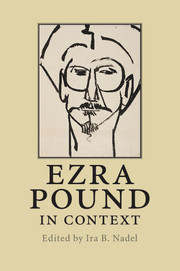Book contents
- Frontmatter
- Contents
- Notes on contributors
- Acknowledgements
- Chronology
- List of abbreviations and note on references to The Cantos
- Introduction
- Part I Biography and works
- Part II Historical and cultural context
- 16 The classics
- 17 Provençal and the troubadours
- 18 Dante and early Italian poetry
- 19 America
- 20 Venice
- 21 London
- 22 Paris
- 23 Rapallo and Rome
- 24 Pisa
- 25 Imagism
- 26 Vorticism
- 27 Music
- 28 Visual arts
- 29 Confucius
- 30 The Orient
- 31 Little magazines
- 32 Publishing and publishers
- 33 Modernism
- 34 Fascism
- 35 Anti-Semitism
- 36 Gender and sexuality
- 37 Race
- 38 Travel
- Part III Critical reception
- Further reading
- Index
21 - London
Published online by Cambridge University Press: 05 July 2014
- Frontmatter
- Contents
- Notes on contributors
- Acknowledgements
- Chronology
- List of abbreviations and note on references to The Cantos
- Introduction
- Part I Biography and works
- Part II Historical and cultural context
- 16 The classics
- 17 Provençal and the troubadours
- 18 Dante and early Italian poetry
- 19 America
- 20 Venice
- 21 London
- 22 Paris
- 23 Rapallo and Rome
- 24 Pisa
- 25 Imagism
- 26 Vorticism
- 27 Music
- 28 Visual arts
- 29 Confucius
- 30 The Orient
- 31 Little magazines
- 32 Publishing and publishers
- 33 Modernism
- 34 Fascism
- 35 Anti-Semitism
- 36 Gender and sexuality
- 37 Race
- 38 Travel
- Part III Critical reception
- Further reading
- Index
Summary
Hugh Selwyn Mauberley (1920) is Pound's most sustained London poem, in his own words “distinctly a farewell” to the city he had come to in 1908 with such high hopes, but now departed in a mood of some bitterness and regret. The poem was also, Pound wrote to John Quinn, a portrait of “today”, the culmination at this point of his attempt to write modern verse with a modern content (EP/JQ, 195). As commentators have regularly reported, the poem chronicles moments in artistic history from the Pre-Raphaelites and the nineties, and their legacy in the Edwardian period, directly naming or alluding to a number of writers and artists, including Flaubert, Rossetti, Swinburne, Victor Plarr, Ernest Dowson, Lionel Johnson, Selwyn Image, Max Beerbohm, Arnold Bennett, and Ford Madox Ford. In addition, it refers indirectly to the First World War poets and to the vorticist sculptor Henri Gaudier-Brzeska, killed in action in June 1915.
But none of this, it has to be said, is of “today” if we understand this to designate the moment of composition in 1919–20. The poem includes nothing of Pound's “Contacts and Life,” in the words of the poem's preferred subtitle, associated with imagism or – aside from the possible reference to Gaudier-Brzeska – the vorticist movement; nothing to evoke Wyndham Lewis, T.S. Eliot or Joyce, and no reference to Pound's involvement in a series of “little magazines” in the period 1913–20 or to the important figures who influenced his thinking such as Allen Upward, A.R. Orage, Ernest Fenollosa and Major C. H. Douglas. The most “contemporary” aspect of the poem, in the sense that this was what occupied Pound in the late 1910s, is its interest in music or of verse to be sung, especially in the twin poems “Envoi” (dated 1919), modeled on Edmund Waller's “Go Lovely Rose!” and “Medallion,” the last poem in the second sequence, titled and dated “Mauberley (1920).”
- Type
- Chapter
- Information
- Ezra Pound in Context , pp. 231 - 240Publisher: Cambridge University PressPrint publication year: 2010



